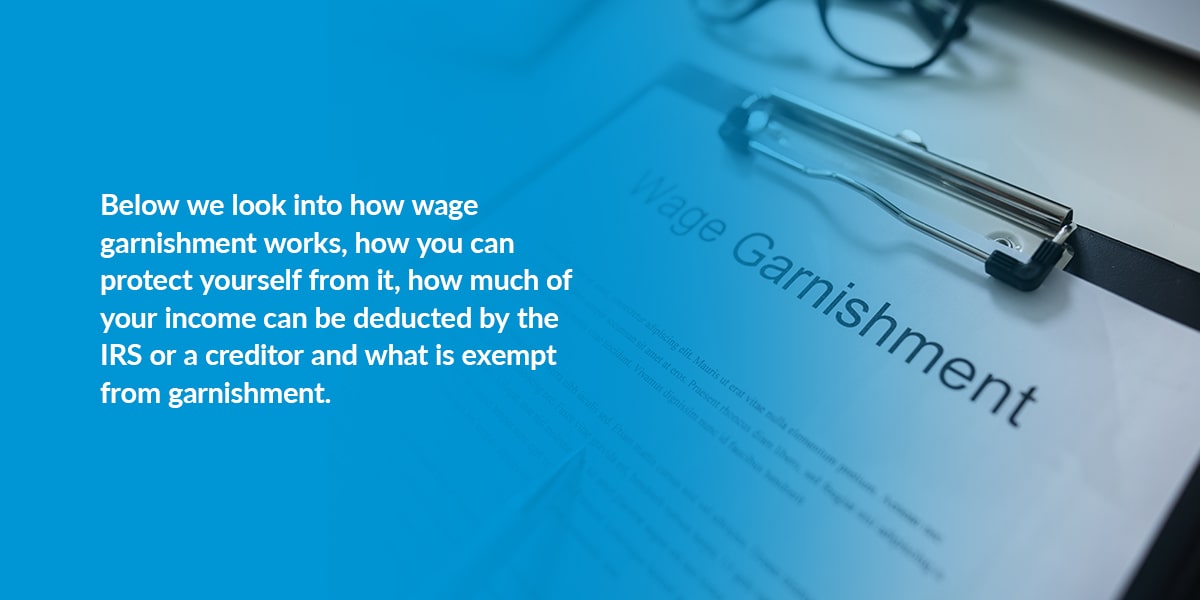When creditors come knocking, the last thing you want is for them to garnish your hard-earned wages. Fortunately, the law provides certain exemptions that can protect your income from being seized, ensuring you have enough to cover your essential living expenses. In this comprehensive guide, we’ll explore the various types of income and assets that are typically exempt from garnishment, empowering you to safeguard your financial well-being.
Understanding Wage Garnishment
Before diving into the exemptions, it’s crucial to understand the concept of wage garnishment. This legal process allows creditors to collect a portion of your wages directly from your employer after obtaining a court order or judgment against you. Creditors can garnish your wages to satisfy various types of debts, including credit card balances, medical bills, and even unpaid taxes.
However, wage garnishment laws vary from state to state, and there are federal and state-level exemptions that can protect a portion or all of your income from being garnished.
Federal Wage Garnishment Exemptions
At the federal level, certain types of income are generally exempt from garnishment by most creditors. These exemptions include:
-
Social Security benefits: Your Social Security income, including retirement and disability benefits, is typically exempt from garnishment by most creditors, with a few exceptions such as federal tax debts, federal student loans, and child support or alimony obligations.
-
Federal student loan income: If you’re receiving federal student loan income, it’s exempt from garnishment by most creditors. However, the U.S. Department of Education or other agencies can garnish up to 15% of your disposable earnings to collect defaulted federal student loan debt.
-
Veterans’ benefits: Most veterans’ benefits, including disability compensation, pension payments, and education benefits, are exempt from garnishment by most creditors.
-
Military pay and allowances: Active-duty military personnel’s pay and allowances are generally protected from garnishment by most creditors, with exceptions for child support, alimony, and certain federal debts.
It’s important to note that these federal exemptions may not protect your income from garnishment for specific debts, such as federal taxes, child support, or alimony obligations.
State-Level Wage Garnishment Exemptions
In addition to federal exemptions, each state has its own set of laws that provide further protection for certain types of income and assets. These exemptions can vary significantly from state to state, but they typically include:
-
Head of household exemptions: Many states offer exemptions for individuals who are the primary financial providers for their households, protecting a portion or all of their wages from garnishment.
-
Retirement account exemptions: Retirement accounts, such as 401(k)s and Individual Retirement Accounts (IRAs), are often exempt from garnishment under state laws.
-
Life insurance and annuity proceeds: Proceeds from life insurance policies and annuities are commonly exempt from garnishment in various states.
-
Disability and welfare benefits: State-level disability and welfare benefits are typically exempt from garnishment by most creditors.
To illustrate, let’s consider Florida’s wage garnishment exemptions. According to Florida law, individuals classified as “head of household” are exempt from having their salary, bonuses, and commissions garnished. Additionally, Florida exempts assets such as retirement accounts like 401(k)s, proceeds from life insurance and annuities, federal student loans, state disability benefits, and state welfare benefits from garnishment.
Claiming Wage Garnishment Exemptions
If you believe your income or assets are exempt from garnishment, you’ll need to follow the proper procedures to claim the exemption. Here’s a general overview of the process:
-
Receive a notice of garnishment: When a creditor obtains a court order or judgment to garnish your wages, you’ll receive a notice informing you of the garnishment and the amount to be withheld from your paycheck.
-
Review the exemptions: Carefully review the exemptions available in your state and determine which ones apply to your situation.
-
File a claim of exemption: Fill out the appropriate form or document, stating the specific exemption(s) you’re claiming and providing any required supporting documentation.
-
Attend a hearing (if necessary): Depending on your state’s laws, you may need to attend a court hearing to explain why the exemption should be granted. Be prepared to present evidence and argue your case.
-
Await the court’s decision: The court will review your claim and supporting documentation and issue a decision on whether the exemption should be granted or denied.
It’s essential to act promptly when you receive a notice of garnishment, as there are typically strict deadlines for filing a claim of exemption. If you miss the deadline, you may forfeit your right to claim the exemption.
Seeking Professional Assistance
Navigating the complex world of wage garnishment exemptions can be challenging, especially when dealing with various state and federal laws. If you’re unsure about your rights or the exemptions available to you, it’s highly recommended to seek the assistance of a qualified attorney or legal professional.
An experienced attorney can review your specific situation, advise you on the applicable exemptions, and guide you through the process of claiming those exemptions. They can also represent you in court hearings and ensure that your rights are protected throughout the garnishment process.
Conclusion
Protecting your hard-earned wages from garnishment is a crucial aspect of maintaining financial stability, especially when facing mounting debts. By understanding the various federal and state-level exemptions available, you can safeguard a portion or all of your income from being seized by creditors.
Remember, the process of claiming exemptions can be complex, and it’s essential to act promptly and follow the proper procedures. If you’re uncertain about your rights or the exemptions that apply to your situation, don’t hesitate to seek professional legal assistance. With the right knowledge and guidance, you can preserve your financial well-being and ensure a more secure future for yourself and your family.
STOP WAGE GARNISHMENT || INCOME EXEMPTION FROM GARNISHMENT
FAQ
What money Cannot be garnished?
What is the most they can garnish from your paycheck?
Which direct deposits are protected from garnishment?
What type of federal benefits Cannot be garnished?

